Trenton, NJ Pollen and Allergy Report for Summer 2023
Pollen Allergy Trends in Trenton, NJ
When is pollen lowest in Trenton, NJ?

February
Lowest month total PPM
Avg. PPM
When is pollen highest in Trenton, NJ?

April
Highest month total PPM
Avg. PPM
How does pollen in Trenton, NJ compare to New Jersey?
Trenton has a higher average PPM than the state of New Jersey.
Trenton yearly avg PPM:
New Jersey yearly avg PPM:
How does pollen in Trenton, NJ compare to the USA?
Trenton has a higher average PPM than the USA.
Trenton yearly avg PPM:
USA yearly avg PPM:
Is pollen worse this year in Trenton, NJ?
Spring 2023 was worse than spring 2022.
Spring 2023 PPM:
Spring 2022 PPM:
Average PPM in Trenton, NJ
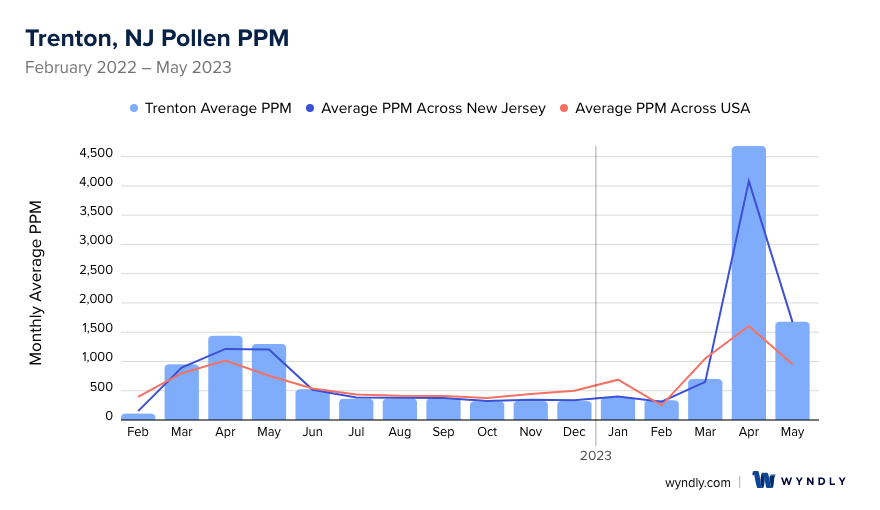
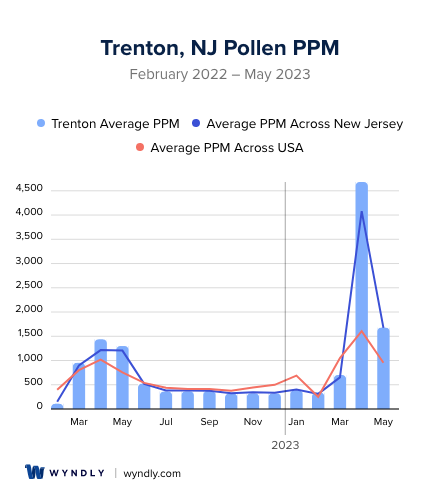
Trenton, NJ Pollen and Allergy Breakdown by Month
Grass
When is grass pollen highest in Trenton, NJ?
April has the highest grass pollen in Trenton, NJ with an average PPM of
When is grass pollen lowest in Trenton, NJ?
December has the lowest grass pollen in Trenton, NJ with an average PPM of
Tree
When is tree pollen highest in Trenton, NJ?
April has the highest tree pollen in Trenton, NJ with an average PPM of
When is tree pollen lowest in Trenton, NJ?
January has the lowest tree pollen in Trenton, NJ with an average PPM of
Weed
When is weed pollen highest in Trenton, NJ?
April has the highest weed pollen in Trenton, NJ with an average PPM of
When is weed pollen lowest in Trenton, NJ?
February has the lowest weed pollen in Trenton, NJ with an average PPM of
Trenton, NJ Pollen Monthly Breakdown by Pollen Type
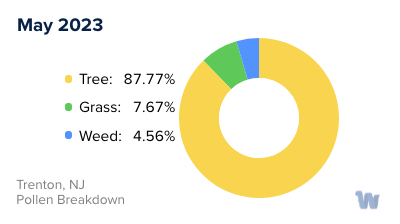
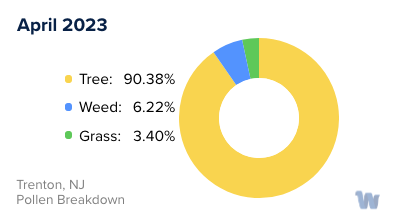
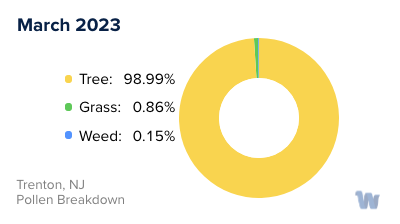
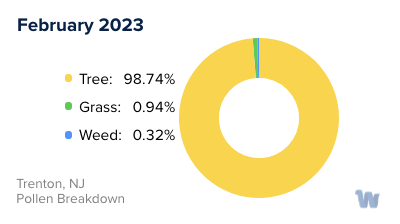
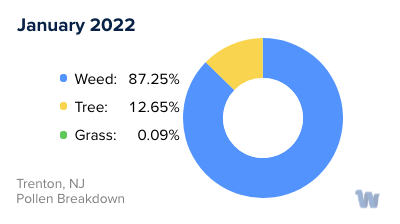
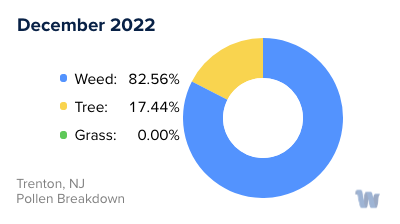
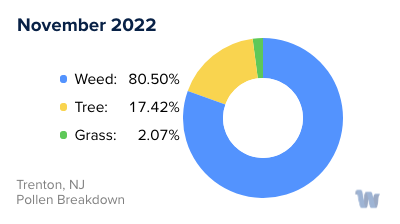
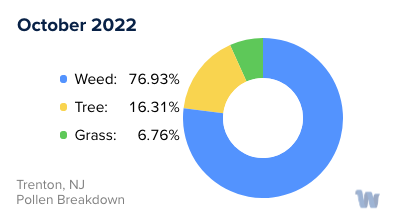
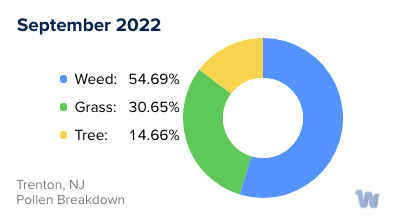
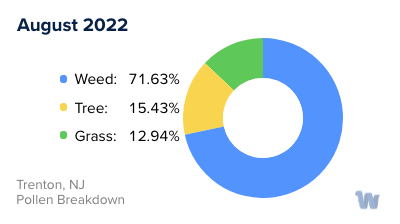
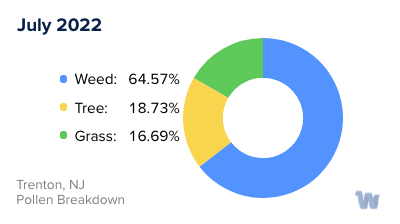
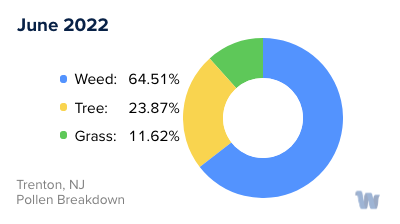
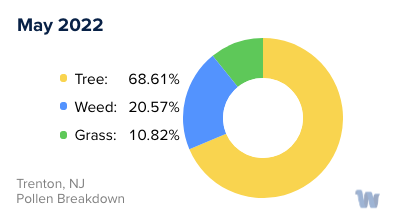
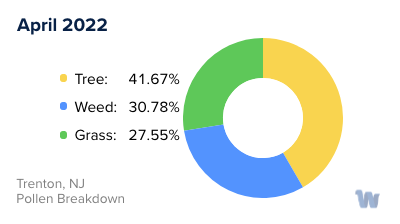
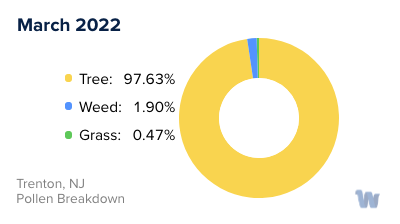
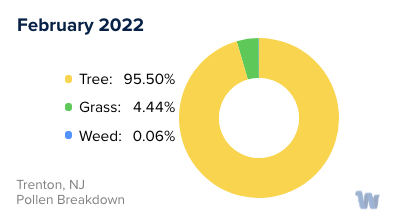
Pollen and Hay Fever in Trenton, NJ
In the charming city of Trenton, New Jersey, the arrival of spring and summer is often accompanied by the blossoming of trees, shrubs, and flowers. However, for many residents, this beautiful transformation also brings the onset of pollen allergies, commonly known as hay fever.
Pollen is a fine powder produced by plants for fertilization. In Trenton, the most common sources of pollen that cause allergies are trees, grasses, and weeds. Tree pollen is generally the first to appear, with levels peaking in the spring. The main culprits include oak, cedar, and pine trees. As we move into late spring and early summer, grass pollen takes center stage. Bermuda grass and Kentucky bluegrass are particularly prominent in the region. In late summer and into the fall, weed pollen, especially from ragweed, becomes the chief concern.
The diversity of plant life in Trenton contributes to an extended pollen season. The combination of a temperate climate and ample rainfall provides an ideal environment for a variety of plants to thrive. This means that depending on the types of pollen one is allergic to, the allergy season can span from early spring all the way through to late fall.
During these periods, pollen grains are carried by the wind, and when inhaled, can trigger allergic reactions in sensitive individuals. Common symptoms include sneezing, runny or stuffy nose, itchy or watery eyes, and throat irritation. It is important to note that pollen counts can vary significantly from day to day based on weather conditions. Dry, windy days typically see higher pollen counts, while rain can help to wash pollen from the air.
Being mindful of the pollen seasons in Trenton and understanding which types of pollen you are sensitive to can help in planning outdoor activities and maintaining a better quality of life during these vibrant seasons.

